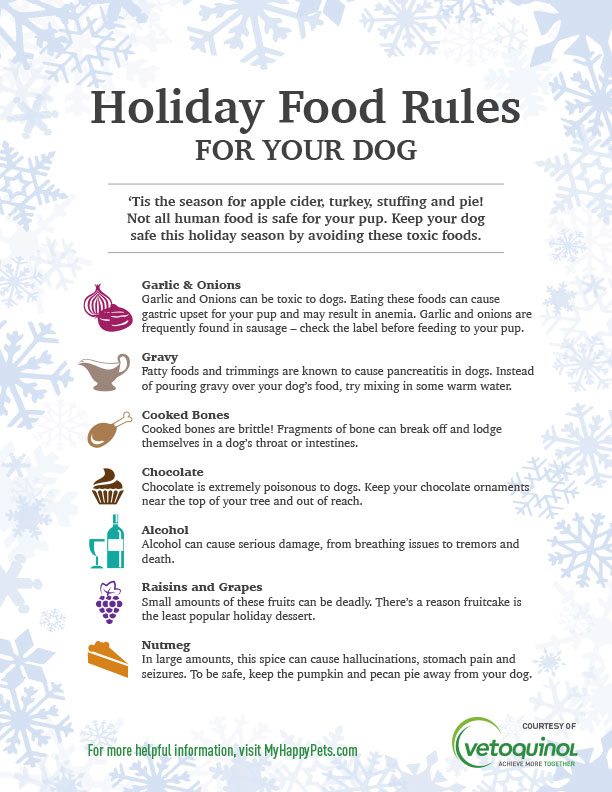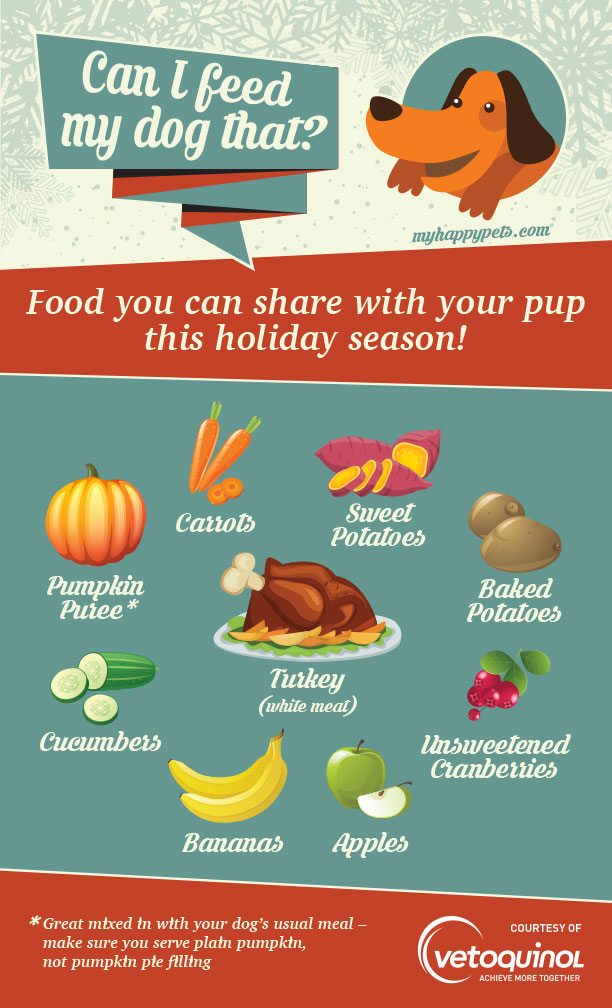Holiday Digital Toolkit
We are happy to provide you with the Holiday Digital Toolkit, a resource that makes it easy to maintain timely, relevant communications with pet parents. The Vetoquinol team is dedicated to helping pets and improving the clinic experience for you and your clients. This digital toolkit is just one of the ways we use our passion for animal health to help you grow your business.
Below, we have provided information you can simply copy and paste into social media posts, on your website, and in emails and letters to your clients. Feel free to use the information as provided or personalize to your taste. The Holiday Digital Toolkit includes the following:
-
-
- 10 social media posts for use on sites such as Facebook, Twitter and Instagram
- 3 articles for use on your website or in newsletters
- Holiday Food Rules for Your Dog (infographic)
- Can My Dog Eat That? (infographic)
-
We hope you find this toolkit to be a valuable resource for your practice. Please feel free to contact your Vetoquinol USA Sales Representative with any questions.
Articles
Use the content below on your website, blog, or in your newsletter.
Holiday Travel Tips
Sponsored by Vetoquinol USA
Holiday travel can be tough. From weather delays and security lines to hours of traffic on the interstate, getting to your family is a battle. If you’re one of the lucky ones who’s four-legged friend makes the trek with you, here are some tips to make traveling with your pet easier.
Before traveling:
- Make sure your pet is up to date on any vaccines and current on flea and tick medicine.
- Visit with your veterinarian and ask about calming supplements, like Zylkene®, to help your pet cope with the stress of travel.
Traveling by plane:
- Flying is best for cats and small dogs that can fit under the seat in front of you. Larger dogs must be stowed in the cargo hold during the flight – this can be frightening for your pet and it come with risks.
- Each airline will have their own pet requirements – research these before booking your flight. If possible, book a direct flight.
- Visit your veterinarian and obtain a health certificate date within 10 days of your trip.
Traveling by car:
- While you might love cruising down the open road, some pets may experience car sickness. Talk to your veterinarian about solutions to car sickness.
- First time driving with your pet? Get your pet acclimated to the car with smaller trips in the weeks leading up to your big drive.
- Small dogs and cats should be kept in a carrier in the back seat. If your pet doesn’t like traveling via carrier, make sure they are secured in the back seat with a seatbelt harness.
- Pack a bag for your pet! Make sure to bring food, water, a favorite toy, poop bags, a blanket or pillow and any medication. On road trip day, give your pet a small meal 3-4 hours before departure.
- Stop frequently for exercise and potty breaks.
- Don’t leave your pet alone in a closed car.
There are a lot of new and unfamiliar sights, sounds and smells when you travel. If your pet does not cope well with changes to their environment, it may be best to leave them at a boarding facility or with a pet sitter.
‘Tis the Season [dog specific]
Sponsored by Vetoquinol USA
 It’s the most wonderful time of the year…but for our pets it can sometimes feel like the most stressful time of the year. Family gatherings, vacations, colder weather and just general busy-ness can create a challenging environment for our pets.
It’s the most wonderful time of the year…but for our pets it can sometimes feel like the most stressful time of the year. Family gatherings, vacations, colder weather and just general busy-ness can create a challenging environment for our pets.
To help our four-legged friends cope better during the holidays here are a few tips:
- Decrease stimuli. If your pets do not like loud noises or unfamiliar people, then do not subject them to the 40 house guests that will be coming over for dinner. Instead, keep them safely tucked away in a quiet room or cozy kennel. You can play classical music or turn on the television to further drown out the commotion coming from all of the “unwanted guests.”
- A tired dog is a good dog. During the holidays, it is important to make the time to continue the daily exercise routine for our pets. It may be especially important for those pets that have difficulty with the challenges of the holidays. It can be useful to fit in some extra exercise on the days prior to and the morning of a big holiday gathering, so that your pet will be more fulfilled. This may help calm them down and act less concerned by all of the commotion.
- Avoid feeding “people food” to your dog. While your pet may be hoping to sample something off your plate at your upcoming gathering, sudden changes to your dog’s diet can cause stomach upset or worse. Certain foods like onions (don’t forget about onion powder!), grapes/raisins, chocolate, etc. can be toxic. Getting into something that is not normally in your dog’s diet can cause gastrointestinal issues that are sure to make the holidays less pleasant for everyone.
- Make sure your dog has identification. Things happen and the busy holiday season is a prime time for the door to be left open or the gate latch to not fully close. For this upcoming holiday, and all year round, your dog should have a sturdy leash and collar. The collar should have identification tags with your phone number, a license, and proof of rabies vaccination. Because collars and tags can fall off, make sure your dog has a permanent ID with a microchip. Keep your contact information current with your recovery service provider.
- Mimic the comforts of home. If you are boarding your dog during the holidays, it’s always a good idea to try and bring some comforts from home to ensure they have as positive an experience as possible. Packing their own food, favorite toys and extra bedding are some examples of things that might make the boarding process smoother. For additional tips around boarding, click here.
- Use a natural calming supplement. For dogs who struggle with disturbances to their environment such as travelling, loud noises, boarding, or hosting a large family gathering, try a calming behavioral supplement such as Zylkene®. Zylkene is a veterinary formulated product containing a unique, milk-derived ingredient that promotes calmness and relaxation without causing drowsiness. For short-term therapy, begin administration 1-2 days ahead of the anticipated event (such as a holiday party.)
*This article does not replace advice from your veterinarian. If you are worried about your pet’s health or behavior always reach out to your veterinarian.
‘Tis the Season [cat specific]
Sponsored by Vetoquinol USA
 It’s the most wonderful time of the year…but for our cats it can sometimes feel like the most stressful time of the year. Family gatherings, vacations and just general busy-ness can create a challenging environment for our feline friends.
It’s the most wonderful time of the year…but for our cats it can sometimes feel like the most stressful time of the year. Family gatherings, vacations and just general busy-ness can create a challenging environment for our feline friends.
To help our cat’s cope better during the holidays here are a few tips:
- Decrease stimuli. If your cats do not like loud noises or unfamiliar people, then do not subject them to the 40 house guests that will be coming over for dinner. Instead, try to keep them safely tucked away in a quiet room. You can play classical music or turn on the television to further drown out the commotion coming from all of the “unwanted guests”. Try this classical playlist!
- Decorations can be dangerous. Many holiday decorations resemble toys to cats and entice them to try and play with them. Tinsel, in particular, is extremely harmful to cats if ingested. Christmas trees, lights and ornaments can also present a problem to cats who like to explore new objects in their domain. Ensure your tree is highly secure and consider decorating with non-glass ornaments if your cat is particularly mischievous.
- Avoid feeding “people food” to your cat. While your pet may be hoping to sample something off your plate at your upcoming gathering, sudden changes to your cat’s diet can cause stomach upset or worse. Certain foods like onions (don’t forget about onion powder!), grapes/raisins, chocolate, etc. can be toxic. Getting into something that is not normally in their diet can cause gastrointestinal issues that are sure to make the holidays less pleasant for everyone.
- Make sure your cat has identification. Things happen and the busy holiday season is a prime time for the door to be left open or the gate latch to not fully close. For this upcoming holiday, and all year round, your cat should have a sturdy leash and collar. The collar should have identification tags with your phone number, a license, and proof of rabies vaccination. And because collars and tags can fall off, make sure your cat has a permanent ID with a microchip. Keep your contact information current with your recovery service provider.
- Mimic the comforts of home. If you are boarding your cat during the holidays, it’s always a good idea to try and bring some comforts from home to ensure they have as positive an experience as possible. Packing their own food, favorite toys and extra bedding are some examples of things that might make the boarding process smoother. It is not a good idea to leave a cat at home alone for prolonged periods of time, they should always receive regular supervision and can experience separation anxiety. For additional tips around boarding, click here.
- Use a natural calming supplement. For cats who struggle with disturbances to their environment such as travelling, loud noises, boarding, or hosting a large family gathering, try a calming behavioral supplement such as Zylkene®. Zylkene is a veterinary formulated product containing a unique, milk-derived ingredient that promotes calmness and relaxation without causing drowsiness. For short-term therapy, begin administration 1-2 days ahead of the anticipated event (such as a holiday party.)
*This article does not replace advice from your veterinarian. If you are worried about your pet’s health or behavior always reach out to your veterinarian.



Social Media Posts
Copy and paste the desired text to your clinic’s Facebook, Twitter or Instagram pages and follow any additional steps as instructed. Right-click the associated image and choose “Save Image As…” to save the image to your computer, then add the image to your post.